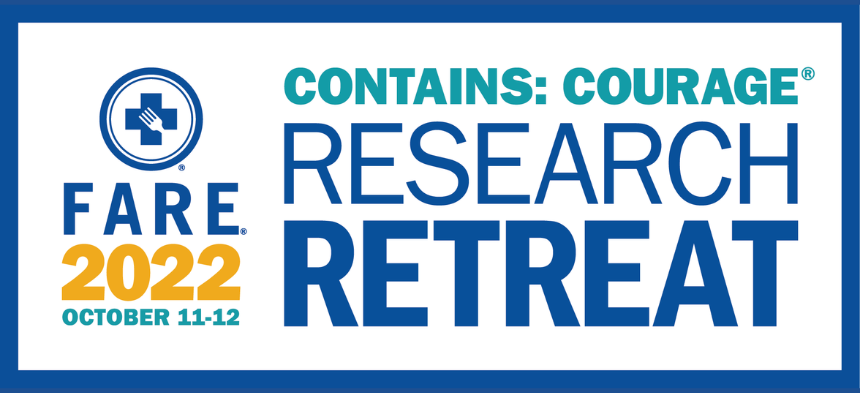Leaders in Research and Clinical Care Shared Findings at Contains: Courage Research Retreat 2022
The virtual conference presented advances in food allergy science, from the laboratory benchtop to the patient’s bedside.

For the past decade, FARE’s annual Research Retreat has brought together experts from academia, the pharmaceutical industry, government, health care and non-profit patient advocacy to learn from each other’s progress and move the food allergy field forward. Since 2020, the Research Retreat has taken place online, reaching a broader audience.
Held Oct. 11-12, 2022, the tenth annual Contains: Courage Research Retreat drew 400 registrants. The two-day virtual event featured recorded talks and live Q&A sessions from 28 speakers who explored recent findings in disease development, patient data, diagnosis, monitoring, treatment, and prevention. Three keynote addresses touched on many of the conferences wide-ranging themes:
Dr. Gideon Lack (Professor of Pediatric Allergy, King’s College London) cited the growing evidence that early egg and milk introduction can reduce the risk of those allergies and noted that delaying peanut until late infancy can limit the effectiveness of early peanut introduction in reducing peanut allergy risk.
Dr. Kari Nadeau (Professor of Medicine and Pediatrics, and Director of the Sean N. Parker Center for Allergy and Asthma Research, Stanford University) discussed efforts to identify effective, family-friendly protocols to introduce multiple foods early, data-driven approaches to assess severe reaction risk without reliance on food challenges, and prospects for using tonsil organoids as a model system to replace non-human animals in pre-clinical studies.
Dr. Alkis Togias (Branch Chief, Allergy, Asthma and Airway Biology Branch, National Institutes of Allergy and Infectious Diseases, National Institute of Health) illustrated the steady increase in federal dollars for food allergy research in recent years and introduced some of the 11 clinical trials in food allergy and eosinophilic esophagitis that NIAID is funding, including six large cohort observational studies.
Some of the presentations highlight FARE’s research program. These include a video introducing the FARE Diversity Scholars, graduate-level students of color who receive mentorship and financial support to pursue their interests in food allergy research and community engagement. The Patient Data session and Q&A also helped to explain FARE research initiatives, including:
- the improved FARE Patient Registry that launched in February 2022
- examples of investigators outside FARE using Registry data to conduct research
- first steps taken by the FARE Clinical Network (FCN) Data Coordination Center to begin aggregating oral food challenge data generated at FCN food allergy centers
If you registered for the Contains: Courage Research Retreat 2022, you can log in to view the 13 hours of keynote addresses, presentations, and Q&A sessions on demand through Jan. 10, 2023.
We thank Aimmune Therapeutics and DBV Technologies for their generous support.


